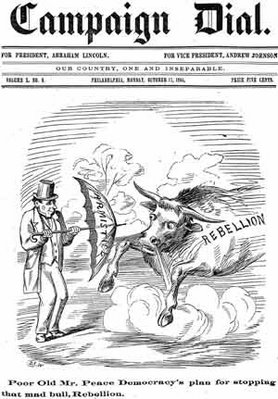Democratic Convention - "THE CHICAGO SURRENDER"

Here is another interesting fact from 1860's as found in "Lincoln" by D.H. Donald and explored in The Wounded Warrior.
This traces the origins of the split on war that still torments the Democratic Party.
Poor Old Mr. Peace Democracy's Plan for stopping that mad bull, Rebellion.
...Then, in the last days of August [1864], with the assembling of the Democratic National Convention at Chicago, the outlook for Lincoln's reelection suddenly brightened. When he asked the newspaperman Noah Brooks to be his informal observer at the convention, the President predicted the outcome:
"They must nominate a Peace Democrat on a war platform, or a War Democrat on a peace platform; and I personally can't say that I care much which they do."
The Democrats lived up to his expectations. Their platform announced that "after four years of failure to restore the Union by the experiment of war,... justice, humanity, liberty and the public welfare demand... a cessation of hostilities," with a view to ending the war "on the basis of the Federal Union of the States." It was not exactly a peace platform, for the Democrats, like the Republicans, were pledged to preserve the Union; but the condemnation of the war and the call for an end of fighting made it easy to brand the platform "the Chicago Surrender." Then the convention nominated General George H. McClellan, the leading War Democrat, for President. The two wings of the Democratic party had struck a bargain: the Peace Democrats, most conspicuously represented by Vallandigham, dictated the platform while their opponents named the presidential candidate. In effect, the Democrats chose to make party harmony their principal goal, even at the risk of defeat in the election.
From all quarters McClellan's friends warned that the platform was a "wet blanket"; "universally condemned," it had probably been "concocted to destroy their candidate." After some delay the general disavowed the peace plank. He could not look in the face of his "gallant comrades of the army and navy, who have survived so many bloody battles, and tell them that their labors and die sacrifice of so many of our slain and wounded brethren had been in vain." But die damage was done. As one of McClellan's admirers said, his letter accepting the nomination of a party on whose platform he could not run amounted to "twaddle and humbug."

0 Comments:
Post a Comment
<< Home